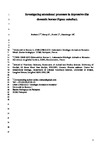Investigating attentional processes in depressive-like domestic horses (Equus caballus).
| dc.contributor.author | Rochais, C | en |
| dc.contributor.author | Henry, S | en |
| dc.contributor.author | Fureix, C | en |
| dc.contributor.author | Hausberger, M | en |
| dc.date.accessioned | 2017-12-12T17:58:12Z | |
| dc.date.available | 2017-12-12T17:58:12Z | |
| dc.date.issued | 2016-03 | en |
| dc.identifier.uri | http://hdl.handle.net/10026.1/10413 | |
| dc.description.abstract |
Some captive/domestic animals respond to confinement by becoming inactive and unresponsive to external stimuli. Human inactivity is one of the behavioural markers of clinical depression, a mental disorder diagnosed by the co-occurrence of symptoms including deficit in selective attention. Some riding horses display 'withdrawn' states of inactivity and low responsiveness to stimuli that resemble the reduced engagement with their environment of some depressed patients. We hypothesized that 'withdrawn' horses experience a depressive-like state and evaluated their level of attention by confronting them with auditory stimuli. Five novel auditory stimuli were broadcasted to 27 horses, including 12 'withdrawn' horses, for 5 days. The horses' reactions and durations of attention were recorded. Non-withdrawn horses reacted more and their attention lasted longer than that of withdrawn horses on the first day, but their durations of attention decreased over days, but those of withdrawn horses remained stable. These results suggest that the withdrawn horses' selective attention is altered, adding to already evidenced common features between this horses' state and human depression. | en |
| dc.format.extent | 93 - 96 | en |
| dc.language | eng | en |
| dc.language.iso | eng | en |
| dc.subject | Attention | en |
| dc.subject | Cognition | en |
| dc.subject | Depression | en |
| dc.subject | Horses | en |
| dc.subject | Welfare | en |
| dc.subject | Acoustic Stimulation | en |
| dc.subject | Animal Husbandry | en |
| dc.subject | Animals | en |
| dc.subject | Attention | en |
| dc.subject | Behavior, Animal | en |
| dc.subject | Cognition | en |
| dc.subject | Depression | en |
| dc.subject | Horse Diseases | en |
| dc.subject | Horses | en |
| dc.title | Investigating attentional processes in depressive-like domestic horses (Equus caballus). | en |
| dc.type | Journal Article | |
| plymouth.author-url | https://www.ncbi.nlm.nih.gov/pubmed/26739514 | en |
| plymouth.volume | 124 | en |
| plymouth.publication-status | Published | en |
| plymouth.journal | Behav Processes | en |
| dc.identifier.doi | 10.1016/j.beproc.2015.12.010 | en |
| plymouth.organisational-group | /Plymouth | |
| plymouth.organisational-group | /Plymouth/Faculty of Science and Engineering | |
| plymouth.organisational-group | /Plymouth/REF 2021 Researchers by UoA | |
| plymouth.organisational-group | /Plymouth/REF 2021 Researchers by UoA/UoA04 Psychology, Psychiatry and Neuroscience | |
| dc.publisher.place | Netherlands | en |
| dcterms.dateAccepted | 2015-12-22 | en |
| dc.identifier.eissn | 1872-8308 | en |
| dc.rights.embargoperiod | Not known | en |
| rioxxterms.versionofrecord | 10.1016/j.beproc.2015.12.010 | en |
| rioxxterms.licenseref.uri | http://www.rioxx.net/licenses/all-rights-reserved | en |
| rioxxterms.licenseref.startdate | 2016-03 | en |
| rioxxterms.type | Journal Article/Review | en |


